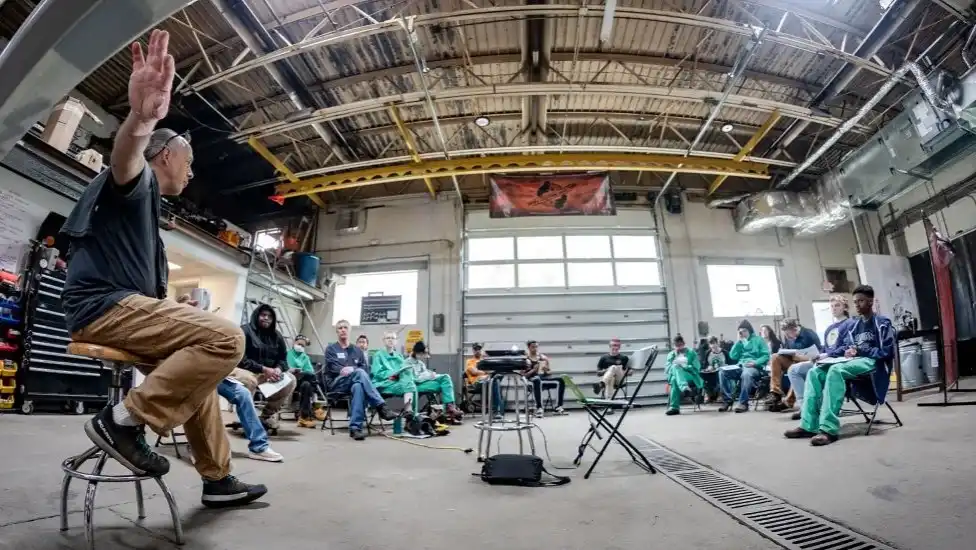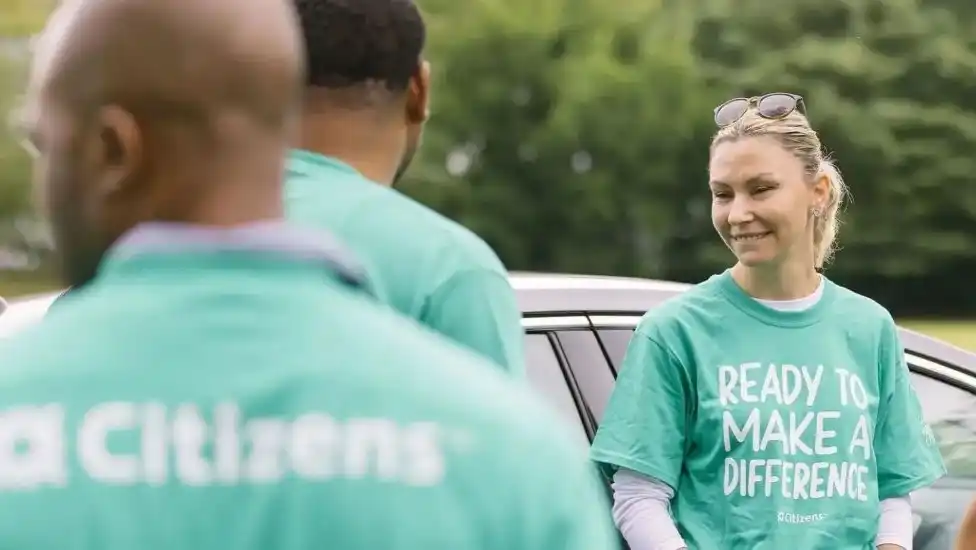Citizens launches initiative to expand digital access and education within affordable housing communities

Key takeaways
- Citizens is committed to helping close the digital divide by investing in resources and education.
- Lack of access to modern technology and the skills to use it has created a digital divide, especially for some traditionally disadvantaged communities.
- Citizens has partnered with affordable housing developers to create digital learning centers in Cleveland, Providence, Boston, New York City, Detroit and New Jersey.
- These spaces are designed to equip residents with the digital tools and resources and wrap-around services that will enable them to thrive both professionally and personally.
At least 12% of American households don’t have home internet service, often because they cannot afford it.
To address this digital divide and expand economic opportunity for traditionally marginalized populations, Citizens has launched an initiative to construct digital learning centers and provide free access to fast-speed internet service within select affordable housing projects.
Citizens has long been a supporter of affordable housing with the understanding that safe, affordable housing is critical to long-term economic security. Since 2013, Citizens has provided nearly $8 billion in financing to support the creation or rehabilitation of nearly 50,000 affordable housing units.
Building on its longstanding relationships with developers, Citizens new digital learning centers and technology projects demonstrate how deeper, more collaborative partnerships between funders and developers can drive meaningful advancements and added benefits for residents and the broader communities. Together, Citizens and its partners are building intentional spaces outfitted with the tools and resources to help residents advance their careers and achieve their potential.

Citizens colleague volunteers standing together on the outdoor playground at the Cleveland Scholar House.
What is the digital divide?
In short, the digital divide is the gap between those who have access to modern technology — such as high-speed internet and internet-enabled devices as well as the skills to use those technologies — and those who don't.
This gap disproportionately affects certain groups, especially those in low-income urban and rural areas, minority and indigenous communities, those with disabilities, as well as refugees and migrants.
Those affected lose out on educational and employment opportunities, government and health care services and more, further limiting social mobility and widening economic disparities.
How wide is the divide?
Although the disparity is wider in some communities than others, cities across the US are seeing similar trends. For example, according to the latest U.S. Census Bureau data, as of 2022, 15% of households in Providence lack internet access and 8% don't have computers. In Cleveland, the numbers are even higher, with 22% of households lacking internet access and 11% are without computers.
How can access to affordable and reliable internet change lives? One recent study shows that 85% of people associated access to the internet with well-being. Internet connection can lead to healthier individuals, better quality of life and more education and economic opportunities.
Closing the gap
As a part of our commitment to fostering strong communities and building the workforce of the future, Citizens is providing $500,000-$1 million in capital beyond our construction financing to build new digital learning centers, along with the implementation of technology resources at select affordable housing projects across our footprint.
“We see our digital learning centers as a new model for how banks can partner with developers to help expand affordable housing and access to the digital tools and training needed to thrive,” says Reza Aghamirzadeh, Head of Community Development at Citizens.
Once a project is selected as a fit, Citizens works closely with developers and management companies to determine how the funding will be allocated to best support the needs of the residents.
Aghamirzadeh adds, “We understand that each community has different needs. By partnering with developers and management companies from the beginning of the project, we are able to align on how our funding will be spent to best meet residents’ needs and identify how Citizens can provide ongoing volunteer support.”
After years of planning, permitting and construction, the first two digital learning centers opened in Cleveland, Ohio, and Providence, Rhode Island, in 2024.
Cleveland Scholar House
Located within walking distance of Cuyahoga Community College’s Metropolitan Campus and Cleveland State University, Cleveland Scholar House is a three-story, 40-unit apartment building for parents who are full time students and earning less than 50% of the area median income.
In addition to $8M in financing to support the construction of the affordable housing project, Citizens provided $500,000 in capital to developers, CHN Housing Partners, to fund a computer lab equipped with computers and high-speed Wi-Fi that has windows with clear line of sight to an adjoining playroom and outdoor playground.

Exterior of the Cleveland Scholar House, a three-story, 40-unit apartment building with a computer lab, playroom and outdoor playground.
Caffey Apartments and Townhomes
In Providence, Citizens supported the construction of the Caffey Apartments and Townhomes, which added 79 units of new affordable housing. Homes are available to those making 30%-80% of the Area Median Income, which, for a two-person household, is between $23,200 and $61,900.
Citizens provided $20M in financing to support the construction of the housing project, along with an additional $500,000 in capital to fund the construction of a technology center equipped with computers that will host wrap-around services to help families achieve independence, self-sufficiency and overall well-being.

Inside the technology center at the Caffey Apartments and Townhomes, which added 79 units of new affordable housing.
M Training Center at the Cathedral Arts Apartments
In Detroit, Citizens partnered with MHT Housing and the Archdiochese of Detroit to construct the M Training Center on the ground floor of the Cathedral Arts Apartments. In addition to its $13.5M in financing to support the construction of the 53 units of affordable housing, Citizens provided $500,000 to fund the construction and build out of the workforce training hub.
Available to residents and the broader community, the M Training Center provides on-site, paid job training for HVAC and property maintenance, which are fields in high demand across the region. This training is coupled with access to digital tools, resume-building workshops and financial education to help ensure participants are equipped with both hard and soft skills needed to thrive.

Inside the M Training Center at the Cathedral Arts Apartments, adding 53 units of affordable housing and a dedicated space for workforce training.
Continued commitment to our communities
In addition to the two projects that have already opened, Citizens has $5M in capital allocated to build digital learning centers and improved technology access at housing developments across four states.
How the funding is being spent differs at each site based on the needs of the residents and input of the developers. From a tech lounge and training room with dedicated workstations, creation of a job training center outfitted with a fully furnished mock apartment designed to offer hands-on learning experience in the maintenance technician field, to 15-years of free high-speed internet access, Citizens is working with partners to drive meaningful impact for the communities served.
“We’re looking forward to the launch of the projects currently underway and seeing the impact that these spaces and enhanced services have on the career advancement and overall well-being of the residents,” says Aghamirzadeh.
Learn more about our Sustainability and Impact efforts here.
Related topics

Convening industry leaders to advance workforce development
Citizens hosts ongoing panel discussions and meetings with community leaders to identify workforce needs and ways to bridge the skills gap.

Giving youth space to create, learn and build a brighter future
The Industrial Arts Workshop in Pittsburgh offers educational opportunities for students to create art, develop skills and start careers.

Promoting equitable opportunities
Citizens participated in a career fair at the NAACP Convention and Career Summit held in Boston.
© Citizens Financial Group, Inc. All rights reserved. Citizens Bank, N.A. Member FDIC
Disclaimer: The information contained herein is for informational purposes only as a service to the public and is not legal advice or a substitute for legal counsel. You should do your own research and/or contact your own legal or tax advisor for assistance with questions you may have on the information contained herein.
